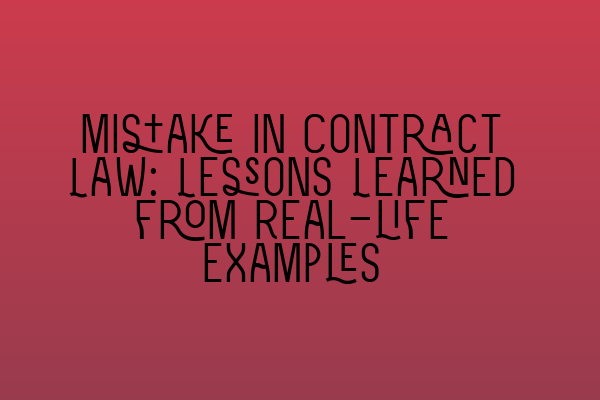Mistake in Contract Law: Lessons Learned from Real-life Examples
Contract law is a complex and intricate area of legal practice. Parties entering into contracts need to be aware of the potential pitfalls and mistakes that can occur, as they can have significant consequences on the outcome of a dispute. In this blog post, we will explore real-life examples of mistakes in contract law, highlighting the lessons learned from each case.
1. Lack of Clarity and Ambiguity
One common mistake in contract law involves the lack of clarity and ambiguity in contract terms. This can lead to disputes and litigation as parties may interpret the terms differently. A recent case highlighted this issue when two parties entered into a contract for the sale of a property, but the contract failed to specify the exact closing date. The lack of clarity resulted in a delay in the closing and additional costs for both parties.
2. Failure to Include Essential Terms
In some cases, parties may forget or neglect to include essential terms in a contract. This can lead to uncertainty and disagreements down the line. For example, a contractor failed to include the duration of the project and payment terms in a construction contract. This led to disputes regarding the timeline and payment schedule, causing delays and additional costs for both parties.
3. Misrepresentation and Fraud
Misrepresentation and fraud can also be significant mistakes in contract law. Parties may provide false information or make misleading statements, leading the other party to enter into a contract under false pretenses. In a recent case, a seller misrepresented the condition of a property, leading the buyer to incur substantial expenses for repairs and renovations.
4. Lack of Knowledge and Understanding
Entering into a contract without a thorough understanding of its terms and implications is a mistake that can have serious consequences. Parties should seek legal advice and ensure they fully comprehend the contract before signing. In a famous case, a business owner unknowingly agreed to an unfavorable non-compete clause, which severely restricted their ability to operate in the same industry after selling their company.
5. Failure to Document Changes
When parties make changes to a contract, it is crucial to document these changes properly. Failure to do so can result in disputes and disagreements regarding the agreed-upon modifications. In a recent case, two parties orally agreed to extend the deadline for delivery of goods but failed to document this change in writing. The lack of proper documentation led to a disagreement and potential breach of contract.
Lessons Learned
These examples illustrate the importance of being meticulous and careful when entering into contracts. Parties should ensure that all contract terms are clearly defined and documented. Seeking legal advice is crucial to avoid mistakes and misunderstandings. Additionally, parties must be honest in their dealings and avoid misrepresentation or fraud.
Related Articles
